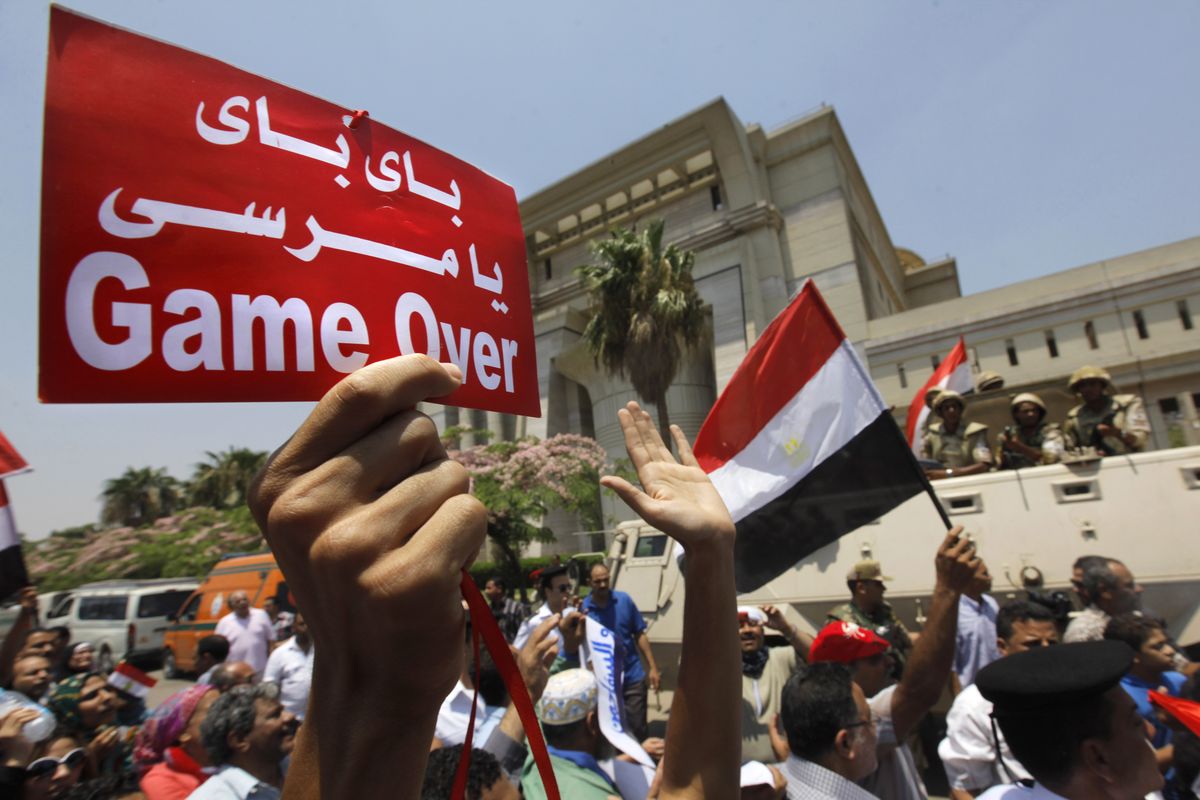Military cracks down on Islamists
Backers of ousted Egyptian leader plan protests today

CAIRO – Egypt’s military moved swiftly Thursday against senior figures of the Muslim Brotherhood, targeting the backbone of support for ousted President Mohammed Morsi. In the most dramatic step, authorities arrested the group’s revered leader from a seaside villa and flew him by helicopter to detention in the capital.
With a top judge newly sworn in as interim president to replace Morsi, the crackdown poses an immediate test to the new army-backed leadership’s promises to guide Egypt to democracy: the question of how to include the 83-year-old fundamentalist group.
That question has long been at the heart of democracy efforts in Egypt. Hosni Mubarak and previous authoritarian regimes banned the group, raising cries even from pro-reform Brotherhood critics that it must be allowed to participate if Egypt was to be free. After Mubarak’s fall, the newly legalized group vaulted to power in elections, with its veteran member Morsi becoming the country’s first freely elected president.
Now the group is reeling under a huge backlash from a public that says the Brotherhood and its Islamist allies abused their electoral mandate. The military forced Morsi out Wednesday after millions of Egyptians nationwide turned out in four days of protests demanding he be removed.
Adly Mansour, the head of the Supreme Constititonal Court, with which Morsi had repeated confrontations, was sworn in as interim president.
Furious over what it calls a military coup against democracy, the Brotherhood said it would not work with the new leadership. It and harder-line Islamist allies called for a wave of protests today, dubbing it the “Friday of Rage,” vowing to escalate if the military does not back down.
There are widespread fears of Islamist violence in retaliation for Morsi’s ouster, and already some former militant extremists have vowed to fight.
Suspected militants opened fire at four sites in northern Sinai, targeting two military checkpoints, a police station and el-Arish airport, where military aircraft are stationed, security officials said. The military and security responded to the attacks, and one soldier was killed and three were injured, according to security officials.
Multiple Brotherhood officials firmly urged their followers to keep their protests peaceful. Thousands of Morsi supporters remained massed in front of a Cairo mosque where they have camped for days, with a line of military armored vehicles across the road keeping watch.
“We declare our complete rejection of the military coup staged against the elected president and the will of the nation,” the Brotherhood said in a statement, read by senior cleric Abdel-Rahman el-Barr to the crowd outside the Rabia al-Adawiya Mosque in Cairo.
“We refuse to participate in any activities with the usurping authorities,” the statement said, urging Morsi supporters to remain peaceful. The Rabia al-Adawiya protesters planned to march today to the Ministry of Defense.
The constitution, which Islamists drafted and Morsi praised as the greatest in the world, has been suspended. Also, Abdel-Meguid Mahmoud, the Mubarak-era top prosecutor whom Morsi removed to much controversy, was reinstated to his post and immediately announced investigations against Brotherhood officials.
Many of the Brotherhood’s opponents want them prosecuted for what they say were crimes committed during Morsi’s rule, just as Mubarak was prosecuted for protester deaths during the 2011 uprising. In the past year, dozens were killed in clashes with Brotherhood supporters and with security forces.
But the swift moves raise perceptions of a revenge campaign against the Brotherhood.
The National Salvation Front, the top opposition political group during Morsi’s presidency and a key member of the coalition that worked with the military in his removal, criticized the moves, saying, “We totally reject excluding any party, particularly political Islamic groups.”
The Front has proposed one of its top leaders, Mohammed ElBaradei, to become prime minister of the interim Cabinet, a post that will hold strong powers since Mansour’s presidency post is considered symbolic. ElBaradei, a Nobel Peace laureate who once headed the U.N. nuclear watchdog agency, is considered Egypt’s top reform advocate.
“Reconciliation is the name of the game, including the Muslim Brotherhood. We need to be inclusive,” Munir Fakhry Abdel-Nour, a leading member of the group, said. “The detentions are a mistake.”
Mansour, the 67-year-old interim president, is a Mubarak appointee like nearly every judge. He had been the deputy head of the court for more than 20 years. He was elevated to the chief justice position this week when his predecessor reached mandatory retirement age.